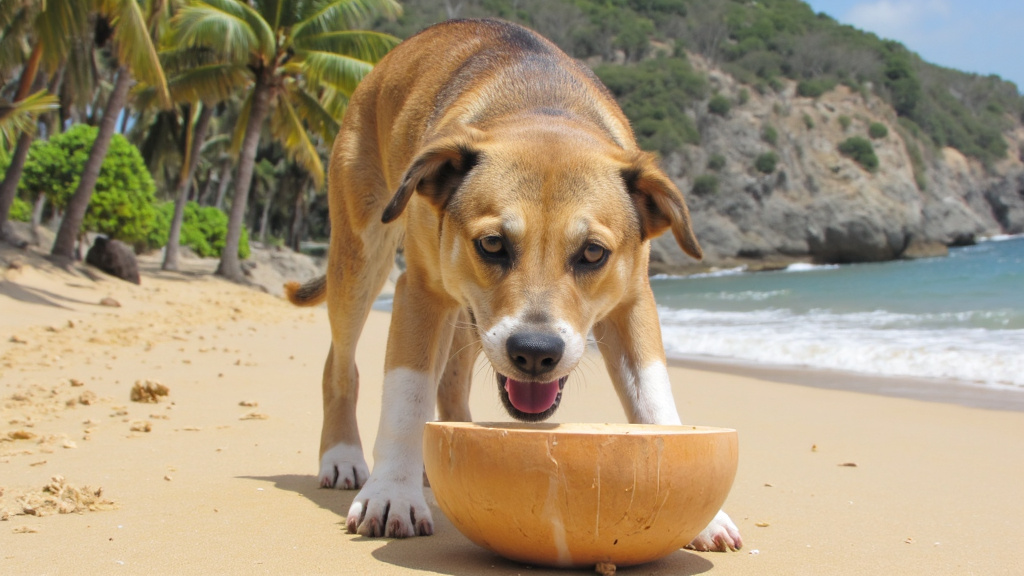
Dogs can safely drink coconut water. While regular water should remain their primary hydration source, coconut water provides a beneficial alternative with notable health advantages.
This tropical drink contains natural electrolytes including potassium, magnesium, and calcium that help maintain proper fluid balance. These minerals are especially beneficial after intense exercise or during hot summer days when hydration is crucial. The natural composition functions like sports drinks but without artificial ingredients.
Coconut water serves as both hydration and nutrition, delivering antioxidants and amino acids that support canine health. Its light, sweet taste often appeals to dogs who may be reluctant to drink plain water. However, moderation is essential – excessive amounts can cause digestive upset or contribute to weight gain.
What Health Benefits Does Coconut Water Offer Dogs?

Coconut water is a natural hydration solution packed with essential nutrients that support your dog’s health. This tropical liquid contains a balanced profile of electrolytes including potassium, magnesium, and calcium—crucial elements that maintain proper bodily functions.
Dogs who engage in vigorous exercise or spend time outdoors during warm weather benefit from coconut water’s hydrating properties. Unlike commercial electrolyte solutions containing artificial ingredients, coconut water provides these minerals naturally.
Natural Electrolyte Replacement
After intense physical activity, dogs lose essential electrolytes through panting and sweating through their paw pads. Coconut water helps replenish these vital minerals quickly. A veterinary nutritionist noted that coconut water contains approximately 600mg of potassium per cup—significantly more than sports drinks—making it exceptionally effective at restoring electrolyte balance.
The natural sodium content in coconut water helps regulate muscle function and nerve transmission, particularly important for active breeds like Border Collies and Australian Shepherds who regularly participate in high-energy activities.
Digestive Health Support
Many dogs suffer from sensitive digestive systems. Coconut water contains natural enzymes that aid digestion and soothe gastrointestinal discomfort. Its gentle nature makes it suitable for dogs recovering from stomach upsets or those prone to digestive issues.
Recent veterinary studies suggest that coconut water may help alleviate symptoms of both diarrhea and constipation by promoting balanced hydration in the digestive tract. Its fiber content works alongside natural enzymes to support regular bowel movements.
Kidney and Urinary Tract Benefits
Proper hydration is essential for kidney health and urinary tract function. Dogs with minor kidney issues may benefit from coconut water’s low phosphorus content. Unlike many commercial drinks, coconut water doesn’t place additional strain on the kidneys while providing necessary hydration.
The diuretic properties of coconut water help flush toxins from your dog’s system, making it valuable for dogs prone to urinary tract infections or those with early-stage kidney concerns. Always consult your veterinarian before using coconut water as a supplement for dogs with diagnosed kidney disease.
Antioxidant Properties
Coconut water contains vitamin C and other antioxidants that combat free radical damage in your dog’s body. These compounds support cellular health and may contribute to a stronger immune system.
Senior dogs especially benefit from additional antioxidant intake as they face age-related oxidative stress. The natural antioxidants provide gentle support without the harsh effects sometimes associated with synthetic supplements.
Practical Serving Recommendations
While coconut water offers numerous benefits, moderation remains key. Small dogs should receive no more than a few teaspoons occasionally, while larger breeds can handle up to a quarter cup as a special treat. Never replace your dog’s regular water intake with coconut water—it should supplement, not substitute.
When selecting coconut water for your dog, choose plain, unsweetened varieties without added sugars or artificial ingredients. Some dogs enjoy coconut water frozen into ice cubes, which provides both hydration and cooling effects during hot weather.
Unlike many trendy supplements, coconut water has demonstrated tangible benefits for canine health across multiple studies. The combination of natural electrolytes, digestive enzymes, and hydrating properties makes it a valuable addition to your dog’s wellness routine when used properly and in appropriate amounts.
How Much Coconut Water Can a Dog Have?
When treating your dog with coconut water, moderation is essential. Dogs process electrolytes differently than humans, making portion control crucial.
For small dogs weighing under 20 pounds, limit coconut water to 1-2 teaspoons per serving. Medium-sized dogs can handle 1-2 tablespoons, while larger breeds may safely consume up to 4 tablespoons. This translates to roughly 1-2 ounces for small dogs and 3-4 ounces for larger ones.
Serving Size Guidelines by Dog Weight
The safe amount depends primarily on your dog’s size. A Chihuahua requires significantly less than a German Shepherd. Use these conservative measurements and monitor for adverse reactions:
- Toy breeds (under 10 lbs): 1 teaspoon (about 5 ml)
- Small breeds (10-20 lbs): 1-2 teaspoons (5-10 ml)
- Medium breeds (21-50 lbs): 1-2 tablespoons (15-30 ml)
- Large breeds (over 50 lbs): 2-4 tablespoons (30-60 ml)
These aren’t daily recommendations—treat coconut water as a once-weekly refreshment rather than a regular hydration source. Plain, fresh water should remain their primary drink.
Potential Risks of Overindulgence
Coconut water contains high levels of potassium—about 600 mg per 8 ounces in many commercial brands. While potassium is essential for muscle and nerve function, excessive amounts can cause hyperkalemia in dogs, a potentially dangerous electrolyte imbalance.
Watch for these warning signs of excessive coconut water consumption:
- Muscle weakness or tremors
- Irregular heartbeat
- Lethargy or unusual fatigue
- Vomiting or nausea
- Diarrhea or digestive upset
If you notice any of these symptoms, contact your veterinarian immediately. Dogs with kidney or heart conditions should avoid coconut water entirely.
Introduction Strategy
Start with a small amount—half a teaspoon for small dogs or one teaspoon for larger breeds. Monitor your dog for 24 hours before offering more. This approach helps identify potential digestive issues or allergic reactions early.
Choose pure, unsweetened coconut water. Commercial brands often contain added sugars, preservatives, or artificial flavors that could be harmful. Read labels carefully to ensure you’re providing only natural benefits.
| Dog Size | Serving Size | Frequency |
|---|---|---|
| Toy breeds (under 10 lbs) | 1 teaspoon | Once a week |
| Small breeds (10-20 lbs) | 1-2 teaspoons | Once a week |
| Medium breeds (21-50 lbs) | 1-2 tablespoons | Once a week |
| Large breeds (over 50 lbs) | 2-4 tablespoons | Once a week |
Limiting coconut water to once weekly prevents potential issues while allowing dogs to enjoy this tropical treat. Consider alternating between coconut water and other healthy hydration options, such as diluted bone broth, for variety.
Remember—coconut water isn’t essential for dogs. While it offers some nutritional benefits, it should never replace regular water intake. Consult your veterinarian for personalized guidance on appropriate serving sizes.
Are There Risks When Giving Dogs Coconut Water?
Coconut water isn’t inherently dangerous for most dogs, but several important considerations exist before sharing this tropical refreshment. Understanding these risks helps you make informed decisions about including it in your dog’s diet.
Weight Management Concerns
Though lower in calories than many human beverages, coconut water still contains natural sugars and calories. A standard 8-ounce serving contains approximately 45-60 calories. Regular consumption can contribute to weight gain, especially for smaller breeds or dogs already struggling with obesity.
The slightly sweet taste may encourage dogs to develop a preference for flavored drinks over plain water, which should always remain their primary hydration source.
| Hydration Option | Benefits | Considerations |
|---|---|---|
| Plain Water | Essential for life, no calories or sugars | Should always be the primary hydration source |
| Coconut Water | Natural electrolytes, supports hydration, tasty for dogs | High potassium, may cause digestive upset in large amounts |
| Dog-safe Electrolyte Supplements | Replenishes electrolytes, tailored for dogs | May contain artificial ingredients, check labels |
| Bone Broth | Rich in nutrients, promotes joint health | High sodium content, should be diluted |
Digestive System Reactions
Some dogs have sensitive digestive systems that react poorly to new foods. Introducing coconut water too quickly or in large amounts might trigger an upset stomach, diarrhea, or vomiting. The high potassium content can also have a mild laxative effect, potentially causing loose stools.
Start with just a few teaspoons for small dogs or a tablespoon for larger breeds, then monitor for any adverse reactions.
Health Condition Complications
Dogs with certain pre-existing health conditions should avoid coconut water entirely. These include:
- Kidney disease: The high potassium levels might burden already compromised kidneys, potentially worsening the condition
- Diabetes: Natural sugars in coconut water can affect blood glucose levels
- Pancreatitis: The fat content, though minimal, may trigger inflammation in sensitive dogs
- Heart conditions: Electrolyte imbalances could potentially affect cardiac function
If your dog is on any medications that interact with potassium, check with your veterinarian before offering coconut water, as it could interfere with treatment efficacy.
Product Quality Concerns
Not all coconut water is created equal. Many commercial brands contain additives that could harm your dog, including:
- Added sugars or artificial sweeteners
- Flavor enhancers
- Preservatives
- Stabilizers
Choose pure, unsweetened coconut water without additional ingredients. The label should list only one ingredient: coconut water.
Electrolyte Imbalance
While coconut water is known for its electrolytes, excessive consumption could potentially lead to an electrolyte imbalance. Symptoms of too much potassium include muscle weakness, irregular heartbeat, nausea, or lethargy.
Plain water should always be your dog’s main source of hydration. Coconut water should never replace regular water in your dog’s daily routine, regardless of how much they enjoy it.
What’s the Difference Between Coconut Water, Milk, and Flesh for Dogs?

Coconut products have become popular dog treats, but each form offers distinct benefits and potential risks. Understanding these differences helps you make informed choices for your dog’s health.
Coconut Water: Nature’s Sports Drink
The clear liquid from young, green coconuts serves as a natural hydration option. Low in calories but rich in electrolytes like potassium, magnesium, and calcium, coconut water can help replenish fluids after exercise or during hot weather.
Small dogs should have no more than a few teaspoons, while larger breeds can handle a few tablespoons at most. Natural sugars in coconut water can contribute to weight gain, so moderation is essential.
Choose pure, unsweetened varieties without additives or preservatives. Dogs with kidney disease should avoid coconut water due to its high potassium content, which could disrupt electrolyte balance.
Coconut Milk: Rich But Risky
Made by blending coconut flesh with water, coconut milk contains significantly more fat than coconut water. This creamy liquid provides medium-chain fatty acids that support immune function and may promote healthier skin and coat.
The high fat content makes coconut milk potentially problematic. Excessive amounts can cause digestive upset, diarrhea, or pancreatitis in susceptible dogs. Offer only small amounts as an occasional treat.
Select unsweetened, organic varieties with minimal additives, as store-bought versions often contain stabilizers or preservatives that may harm your dog.
Coconut Flesh: Beneficial But Calorie-Dense
Coconut meat provides medium-chain triglycerides (MCTs) that support brain function, immune health, and metabolism. Studies suggest MCTs may reduce inflammation and enhance cognitive function in older dogs.
The high fiber and fat content may cause digestive issues in sensitive dogs. Cut fresh coconut into small pieces to prevent choking and limit portions to a few pieces as occasional treats.
Keep coconut shells and husks away from your dog, as they present serious choking hazards and can damage teeth or cause intestinal blockages.
Conclusion: Enjoying Coconut Water Safely With Your Dog

Coconut water can support your dog’s hydration needs with its beneficial electrolytes and nutrients, complementing regular water intake during warm weather or after exercise. Its natural sweetness may appeal to dogs who are hesitant to drink water.
As your dog stays active and hydrated—whether during summer adventures or post-play recovery—tools like the Halo Collar help you monitor their wellbeing with confidence.
With GPS tracking and wireless dog fencing, Halo keeps tabs on your dog’s energy output and location, ensuring they stay safe while exploring or exercising. When you offer coconut water as a thoughtful hydration boost, Halo’s data can even help you gauge when it’s most needed, supporting a balanced, health-conscious lifestyle tailored to your dog’s unique rhythm.
Interested in exploring more common canine health and safety concerns? Visit our dog health and dog safety pages for expert tips and advice on a wide range of issues.





